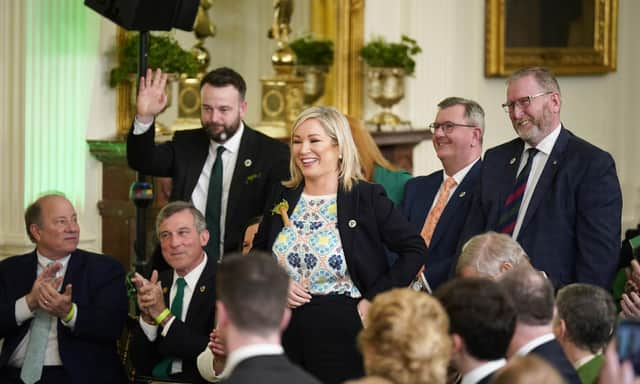Owen Polley: The DUP has been distracted from the Windsor Framework by a week of Paddywhackery in Washington


It’s depressing that, rather than engage fully with economic debates at Westminster, many of our parties felt it was more important to schmooze with Americans enjoying their annual week of shamrocks and paddywhackery.
Over many decades, unionists have failed to put their case persuasively to audiences at home and abroad. So we shouldn’t carp too much when they try to put that problem right.
Advertisement
Hide AdAdvertisement
Hide AdAt the same time, Northern Ireland has been allowed to become so different - and nationalists’ attempts to internationalise our politics have been so successful that pro-Union politicians are more energised by attending the National Press Club in the US than analysing our economic prospects with the Chancellor of the Exchequer.
That was why Sir Jeffrey Donaldson gave his long-awaited response to the NI Protocol deal on the other side of the Atlantic, rather than in the vicinity of the House of Commons.
In a long statement, the DUP expressed dissatisfaction with the ‘Windsor Framework’, claiming that some of it needed to be ‘clarified’ and required ‘further reworking’.
Unfortunately, though, the statement still used fairly abstract terms, rather than saying clearly what the Framework does or doesn’t do to the party’s satisfaction.
Advertisement
Hide AdAdvertisement
Hide AdTo take one example, Sir Jeffrey said that the deal left ‘unfinished business’ when it came to protecting ‘Northern Ireland’s place in the UK internal market.’ That’s not inaccurate, but it does not explain precisely what protection his party wants to see. Likewise, the Protocol’s impact on Article 6 of the Act of Union is vitally important, but many voters will be confused by what exactly that means.
You’d hope that one major issue for the DUP is the fact that Northern Ireland continues to be in the single market for goods.
The government claimed that the Framework effectively created ‘dual regulation’ for food products here, meaning that they can meet British rather than EU standards, if they’re for sale in supermarkets.
It’s not entirely clear yet how watertight that guarantee will turn out to be. Why on Earth, though, can’t a similar type of arrangement extend to other things that we buy in Northern Ireland’s shops?
Advertisement
Hide AdAdvertisement
Hide AdSome trade experts have pointed out that the Framework forces companies to label goods for sale here with the phrase ‘not for EU’. You would think, then, that it would be easy enough, and risk-free for Brussels, to allow these products to meet British regulations rather than those of the single market. Otherwise, what is the purpose of the labels?
Some clear and modest demands like this, at a point when the two sides are desperate to portray their agreement as a success, might have more impact than the DUP’s murkier criticisms. There are certainly other complex, constitutional issues with the Framework, but both Brussels and the government claim that they are in the business of solving practical conundrums.
The deal is currently portrayed as the best that is available for Northern Ireland, but, as usual with the EU, everything is impossible, indeed absolutely unthinkable, until it suddenly isn’t.
Perhaps, after our politicians’ visit, US decision-makers will press Brussels to show just a little more flexibility. You would not bet on it though.
Advertisement
Hide AdAdvertisement
Hide AdEven as Donaldson explained how unionists’ concerns about the protocol had been overridden repeatedly, at a dinner in Washington the US senate’s majority leader lectured the DUP on getting back to “the people’s business. The business of power-sharing and self-governing.” This drew the testy response from Sir Jeffrey that Chuck Schumer should “read some history books.”
You would think that unionists should currently be in such intense discussions with their own government that they would have little time for anything else. Rishi Sunak sold the Framework as a comprehensive solution to the Irish Sea border that would restore Northern Ireland’s place in the UK internal market. Ministers should be pressed to justify these claims, particularly where there are already serious doubts about how the new arrangements will work.
During the budget, the former DUP adviser, Richard Bullick, tweeted that he was, “Waiting for a UK wide… measure that was possible under the Windsor Framework but wouldn’t have been possible under the protocol.” The answer, when it finally came, was that the government could lower the rate of tax on draft beer, including in Northern Ireland.
The Chancellor announced a potentially more significant plan to create a dozen low tax ‘enterprise hubs’, including one in Northern Ireland. But DUP MP Sammy Wilson expressed immediate cynicism about whether Jeremy Hunt could deliver this kind of project, thanks to the continued application of EU laws here. That’s the kind of detail that the government has not yet revealed about the protocol deal, but it’s not the sort of thing that will be resolved at Irish American dinners.
Advertisement
Hide AdAdvertisement
Hide AdRishi Sunak seems determined to push ahead with the Framework before many of these issues have been explored fully. There are indications that the government may now only subject the agreement to one vote at Westminster and that will be on the so-called 'Stormont brake'.
If that's the case, it’s going to be even more tricky for unionists to decide upon their best response. But they could at least be clear and decisive in their analysis of the Framework’s strengths and failings.